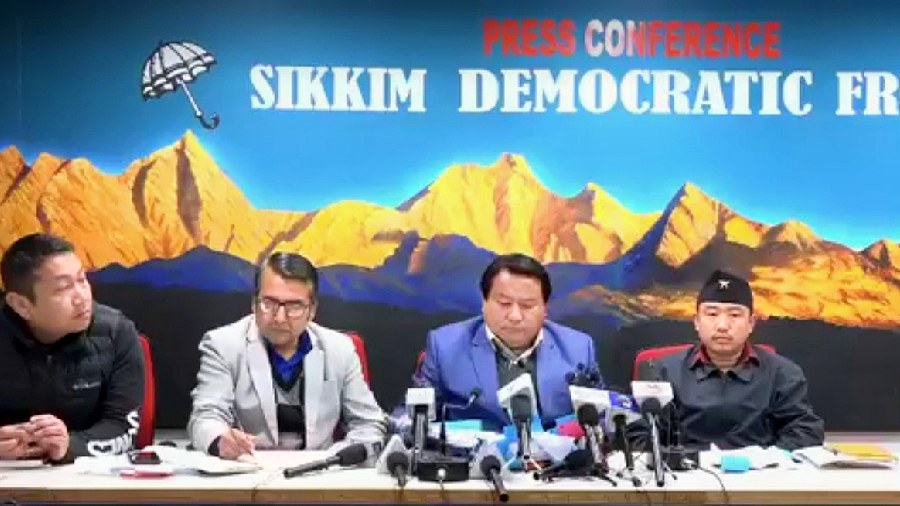The Sikkim Democratic Front (SDF) has warned that any violation of the unique status of Sikkim as provided by Article 371F of the Constitution could lead to the state, which had merged with India in 1975, becoming independent once again.
The warning came from SDF chief spokesperson M.K. Subba who addressed a press conference at the party office in Gangtok on Wednesday. He made the remark in the context of the recent Supreme Court verdict that granted income tax exemption to the old settlers of Sikkim by including them within the purview of the definition of Sikkimese by citing Article 14 of the Constitution, which guarantees equality before the law.
Subba, however, contended that Article 14 cannot be implemented in Sikkim because of Article 371F, which has a non-obstante clause to uphold its enforceability over another provision that is contradictory to it. “What are the political consequences of this case in Sikkim? Number 1, like I said before, Article 14 of the Constitution of India has entered Sikkim now...,” he said.
The SDF leader said categorising old Indian settlers residing in Sikkim since before 1975 as Sikkimese on the basis of Article 14 was a violation of the old laws of Sikkim, which are protected by clause (m) of Article 371F. Sikkimese, he added, are only those whose names are registered in the pre-merger Register of Sikkim Subjects and their immediate descendants.
Clause (m) of Article 371F reads: “neither the Supreme Court nor any other court shall have jurisdiction in respect of any dispute or other matter arising out of any treaty, agreement, engagement or other similar instrument relating to Sikkim which was entered into or executed before the appointed day and to which the Government of India or any of its predecessor Governments was a party, but nothing in this clause shall be construed to derogate from the provisions of Article 143”.
With the recent Supreme Court order, Subba said, it would also mean that the reservation provided in the Sikkim Assembly to the tribal Bhutia and Lepcha (BL) communities and sangha, which is a body of monks, would not hold scrutiny under Article 14. Unlike in the rest of the country where quota is provided on the basis of population ratio, it is not the case for the BL and sangha seat in Sikkim. “This has been made possible because of the non-obstante clause in Article 371F,” said Subba.
“If all these treaties are violated, we, too, will be independent like Bhutan and Nepal.... These are all sensitive matters. We have been forced to speak about these because it is the battle for our existence. We are not talking nonsense. We have always spoken on the basis of rules, treaties and laws,” said Subba.
Stating that Sikkim had reached a turning point, Subba said: “The existence of Sikkim has come to a decisive phase. We also should take some steps, otherwise, nothing will happen. Absolutely clear, if two more such judgements are delivered, the only thing that remains to be said is: ‘you go back to your land’.”
The SDF, which had ruled Sikkim for around 25 years till 2019, said the time had now come to look afresh at the merger of Sikkim with India.
“It (the merger) must be reviewed once. It must be revived. It must be revisited. Otherwise, nothing will happen. You cannot go on like this forever and ever. This is our number 1 stand,” he added.
Law officer quits
There were no signs of the raging controversy over the reference to the Sikkimese Nepalis as being of “foreign origin” and “migrants” in the Supreme Court verdict ebbing anytime soon with Sudesh Joshi resigning as the additional advocate general of Sikkim on Wednesday.
His dismissal was among one of the three demands made by the apolitical Joint Action Committee which had organised mass protest rallies throughout the state on Tuesday.
The committee was formed a few days back in the wake of the Apex Court judgement ofJanuary 13.
The other demands were immediate holding of a special session of the state Assembly to pass a resolution against the expressions used in the observation part, and not the operative part, of the judgment.
D. R. Thapa, a BJP MLA, who had also taken part in the rally in Gangtok on Tuesday, submitted a petition to Sikkim governor Ganga Prasad on Wednesday demanding an emergency session of the Assembly to discuss the SupremeCourt verdict.











